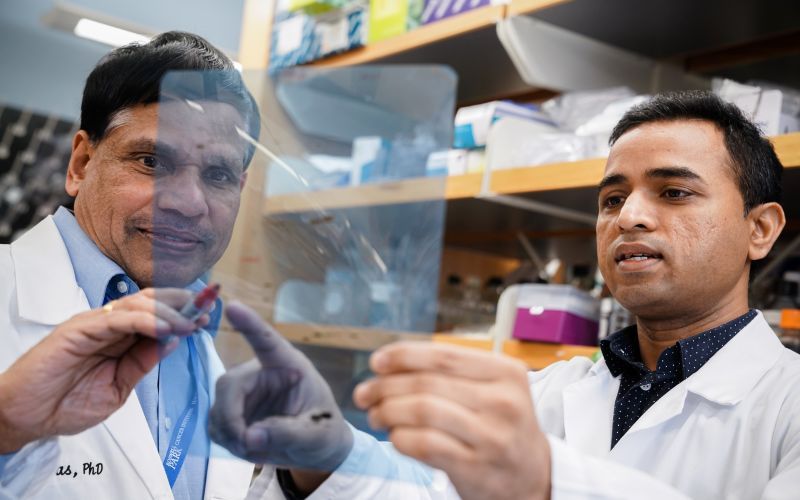Roswell Park team identifies first known prognostic marker for these aggressive tumors
- TNBC tumors lack 3 key receptors that existing therapies target
- Team led by Dr. Gokul Das focused on a different receptor, ER-beta
- They demonstrate that tamoxifen may be effective against many TNBC tumors
BUFFALO, N.Y. — One of the mechanisms that makes so-called triple-negative breast cancer (TNBC) notoriously aggressive and hard to treat is its ability to disarm proteins that suppress tumors and mutate them into tumor drivers. Seeking to better understand this process, a team from Roswell Park Comprehensive Cancer Center decided to focus not on what these TNBC tumors lack — the estrogen receptor (ER-alpha), progesterone receptor (PR), and HER2 proteins — but something they possess: an alternate estrogen receptor, ER-beta. What they found, in collaboration with an international team of researchers, and report in a new article in JNCI: Journal of the National Cancer Institute, is that a widely used breast cancer drug, tamoxifen, can turn the ER-beta protein into a double agent capable of disrupting the processes that typically make TNBC tumors so devastating.
Tamoxifen is approved for treatment and prevention of ER-alpha-positive breast cancers, but was previously thought not to be effective against TNBC tumors because it targets ER-alpha, one of the proteins they lack. But this new work from a team led by Gokul Das, PhD, Professor of Oncology in the Department of Pharmacology and Therapeutics and Co-Director of the Breast Disease Site Research Group at Roswell Park, proposes a new role for this broadly studied and well-tolerated targeted agent: targeting ER-beta.
Mutation of an important tumor suppressor, the TP53 protein (also known as p53), is known to be the major mechanism behind most triple-negative breast tumors. In TNBC with normal TP53, ER-beta binds to normal TP53, disabling its tumor-suppressing capabilities and resulting in aggressive tumor behavior. But Dr. Das and colleagues show here that in TNBC with mutated TP53, ER-beta functions as a tumor suppressor by binding to mutated TP53, preventing it from functioning as a tumor driver.
“We demonstrate that ER-beta directly binds to TP53 and influences its function, and that what happens from there hinges on what type of TP53 the tumor cells have. ER-beta can have diametrically opposite functional capabilities depending on what type of TP53 — normal or mutated — is present in the tumors,” notes co-first author Chetan Oturkar, PhD, a research affiliate in Dr. Das’ lab.
The researchers report based on a series of preclinical studies that tamoxifen increases binding of ER-beta to mutated TP53 in TNBC leading to death of cancer cells, and their analysis of a large breast cancer patient database showed that high levels of ER-beta in TNBC with mutated TP53 are associated with a more favorable prognosis.
“We have uncovered what we believe is the first known prognostic marker for triple-negative breast cancer, opening up an important opportunity to repurpose tamoxifen to treat TNBC,” says Dr. Das. “We are particularly pleased and excited to see that a readily available drug that has safely been given to hundreds of thousands of patients with or at risk for other types of breast cancer may be used to treat a disease subtype for which there are no effective therapies at present.”
The team expects to move this work forward with a clinical trial to validate and further assess these laboratory findings.
The study, “TP53 Status as a Determinant of Pro-versus Anti-tumorigenic Effects of Estrogen Receptor-beta in Breast Cancer,” is available at https://academic.oup.com/jnci/advance-article/doi/10.1093/jnci/djz051/5452444, and a related editorial at https://academic.oup.com/jnci/advance-article/doi/10.1093/jnci/djz052/5452445. This research was supported in part by several grants from the National Cancer Institute, or NCI (project numbers CA079911, CA009072, CA125123 and P30CA016056), as well as support from Susan G. Komen for the Cure, The Jayne & Phil Hubbell Family, the Breast Cancer Coalition of Rochester, the Graduate Student Association of the University at Buffalo, the University at Buffalo, the Dan L. Duncan Comprehensive Cancer Center at Baylor College of Medicine, Cutco Corp. and by donations to Roswell Park.
###
Roswell Park Comprehensive Cancer Center is a community united by the drive to eliminate cancer’s grip on humanity by unlocking its secrets through personalized approaches and unleashing the healing power of hope. Founded by Dr. Roswell Park in 1898, it is the only National Cancer Institute-designated comprehensive cancer center in Upstate New York. Learn more at www.roswellpark.org, or contact us at 1-800-ROSWELL (1-800-767-9355) or ASKRoswell@RoswellPark.org.
Annie Deck-Miller, Senior Media Relations Manager
716-845-8593; annie.deck-miller@roswellpark.org
